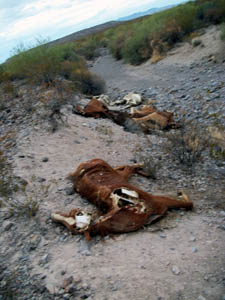Coggins Papers Don’t Match Horses Going to Mexico, Scores of Horses Found in Presidio County’s Cibolo Creek
Photos Courtesy Ray Field, Wild Horse Foundation,
By Steven Long,
 HOUSTON, (Horseback) – An investigator familiar with the ongoing investigation of animal cruelty and public health issues at a Presidio, Texas feedlot for slaughter bound horses confirmed Friday that basic federal health documentation is non-existent on slaughter horses bound for kill pens in Mexico.
HOUSTON, (Horseback) – An investigator familiar with the ongoing investigation of animal cruelty and public health issues at a Presidio, Texas feedlot for slaughter bound horses confirmed Friday that basic federal health documentation is non-existent on slaughter horses bound for kill pens in Mexico.The longtime investigator, with the Texas Animal Health Commission, told Horseback Online that “None of them have valid Coggins.”
The investigator was in Presidio last week probing scores of horses dumped into a pit in the Cibolo Creek watershed that leads to the Rio Grande.
“The carcasses were in varying stages of decay, but we were able to recover microchips and tags which will enable us to trace them back to the sellers,” he said.
The horses are in a holding pen for animals going soon across the border to a Mexican slaughterhouse.

Other horses were found in a nearby creek and photographed Friday.
He declined to be identified for security reasons.
The bottom of each (Coggins) form certifying a horse is free of Equine Infectious Anemia states “Falsification of this form or knowingly using a falsified form is a criminal offense and may result in a fine of not more than $10,000 or imprisonment for not more than 5 years or both (U.S,C. Section 1001),”
It is a federal offense. The form is printed by the U.S. Department of Agriculture Animal and Plant Inspection Service.
Horse owners are required by law to always have their Coggins certificate with their horse.
Thus far, there is no federal involvement in the ongoing investigation. Dead horses were spotted during a fly over earlier in the week by Ray Field, director of the Franklin, Texas based Wild Horse Foundation.
While each of the horses going across the border to slaughter carries a “Coggins” document, virtually none of them match the horse they represent, say sources knowledgeable of the current investigation. Yet the fraud is overlooked by the state because the horses are at the end of their lifeline.
“I’ve been trying to get the transporters to comply with Texas regulations,” he said.

Asked if charges would be filed, he said “No.”
Many of the horses photographed in the pen are have grotesque injuries, injuries so bad Horseback declines to display them.
The horses at the center of the current controversy were “unloaded last weekend in the middle of the night,” he said. “They were in very bad shape, 20 of them.









No comments:
Post a Comment